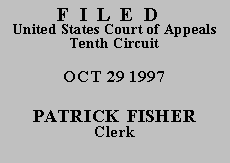

|
UNITED STATES OF AMERICA, |
|
Before SEYMOUR, Chief Judge, PORFILIO and MURPHY, Circuit Judges.
Appellant Leslie Nordine Monson was charged with (1) conspiracy to distribute methamphetamine; (2) possession of methamphetamine with intent to distribute; and (3) maintaining a place for the purpose of manufacturing, distributing, and using methamphetamine. On the second day of jury trial, Monson pleaded guilty to possession of methamphetamine with intent to distribute. The other two counts were dismissed. The district court sentenced Monson to imprisonment for a term of 135 months, based on an adjusted offense level of thirty-two. Monson appeals the district court's refusal to grant him a two-level reduction for acceptance of responsibility under U.S.S.G. § 3E1.1(a).(1)
At sentencing, the defendant has the burden of proving by a preponderance of the evidence that he is entitled to a reduction for acceptance of responsibility under U.S.S.G. § 3E1.1(a). See United States v. Meyers, 95 F.3d 1475, 1486 (10th Cir. 1996); United States v. McMahon, 91 F.3d 1394, 1396-97 (10th Cir.), cert. denied, 117 S. Ct. 533 (1996). Whether the defendant has met this burden is a factual question which this court reviews only for clear error. See Meyers, 95 F.3d at 1486; McMahon, 91 F.3d at 1396. In reviewing the district court's findings, "we remain mindful that '[t]he sentencing judge is in a unique position to evaluate a defendant's acceptance of responsibility. For this reason, the determination of the sentencing judge is entitled to great deference on review.'"
United States v. Ivy, 83 F.3d 1266, 1292-93 (10th Cir.) (quoting U.S.S.G. § 3E1.1 Application Note 5), cert. denied, 117 S. Ct. 253 (1996); see also Meyers, 95 F.3d at 1487.
In denying a reduction for acceptance of responsibility, the district court relied on Monson's initial failure during his presentence interview to admit his involvement with methamphetamine possession and distribution. Since Monson admitted his conduct during the presentence interview only after being urged to do so by his attorney, the court found that Monson did not adequately accept responsibility for his conduct.
Additionally, at sentencing, Monson challenged the drug quantities testified to by Mr. Laden. The district court determined that Laden's testimony was credible and thus concluded Monson had falsely denied relevant conduct amounts. Application Note 1(a) to U.S.S.G.§ 3E1.1 provides that while a defendant need not affirmatively admit relevant conduct beyond the offense of conviction, "a defendant who falsely denies, or frivolously contests, relevant conduct that the court determines to be true has acted in a manner inconsistent with acceptance of responsibility." U.S.S.G. § 3E1.1 Application Note 1(a); see also United States v. Contreras, 59 F.3d 1038, 1040-41 (10th Cir. 1995); United States v. Anderson, 15 F.3d 979, 981 (10th Cir. 1994).
Based on the district courts findings, which are adequately supported by the record, the denial of a two-level reduction for acceptance of responsibility was not clearly erroneous. The judgment of the district court is AFFIRMED.
ENTERED FOR THE COURT
Michael R. Murphy
Circuit Judge
*. This order and judgment is not binding precedent, except under the doctrines of law of the case, res judicata and collateral estoppel. The court generally disfavors the citation of orders and judgments; nevertheless, an order and judgment may be cited under the terms and conditions of 10th Cir. R. 36.3.
1.Section 3E1.1(a) of the Sentencing Guidelines provides: "If the defendant clearly demonstrates acceptance of responsibility for his offense, decrease the offense level by 2 levels." U.S.S.G. § 3E1.1(a).